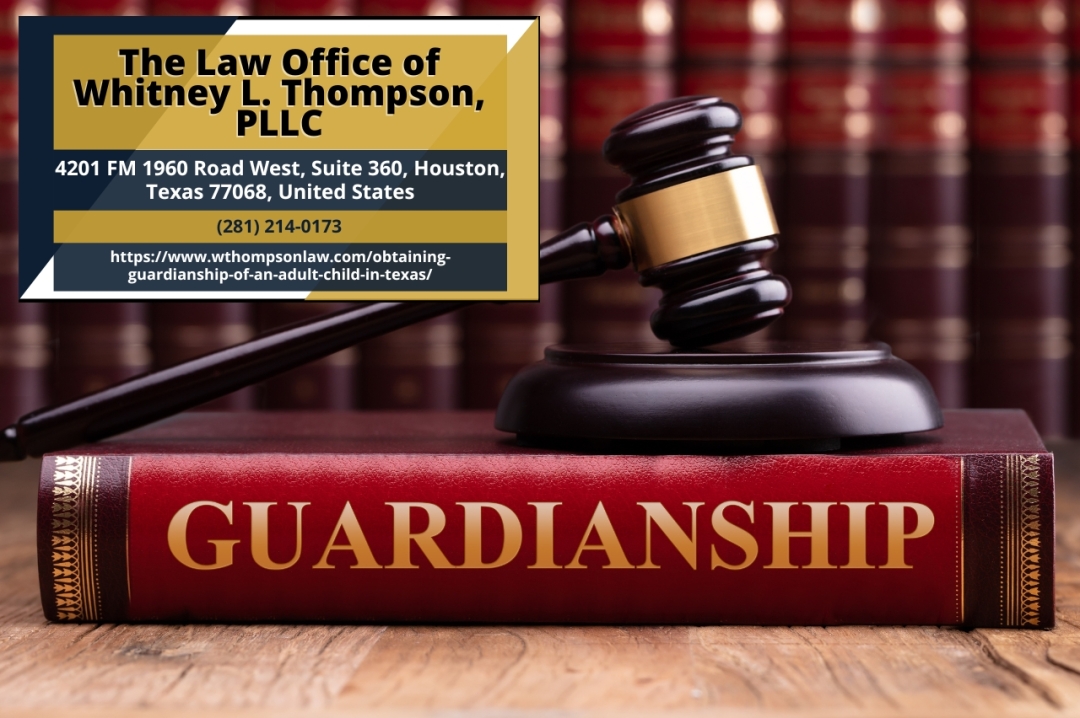For parents of children with disabilities, the transition to adulthood brings new challenges—especially when it comes to continuing to make important decisions on behalf of their children after they turn 18. Houston guardianship attorney Whitney L. Thompson (https://www.wthompsonlaw.com/obtaining-guardianship-of-an-adult-child-in-texas/) of The Law Office of Whitney Thompson is helping Texas families understand the process of obtaining guardianship of an adult child to ensure their loved one’s well-being and protection.
When a child reaches the age of 18 in Texas, parents no longer have the legal authority to make decisions on their behalf, regardless of the child’s physical or mental capacity. This legal change prompts many families to seek guidance from a Houston guardianship attorney like Whitney L. Thompson, who helps them petition the probate court to become legal guardians. As explained in the article, “Courts will always seek to keep the incapacitated person as an independent person,” which means guardianship is often limited to specific areas of the adult child's life, such as healthcare or finances, based on demonstrated need.
Whitney L. Thompson, a Houston guardianship attorney, emphasizes that the legal process of securing guardianship can be detailed and complex. Parents or caregivers are required to provide a clear outline of the adult child’s functional limitations—such as whether they can manage daily hygiene, financial decisions, or personal safety—and may also need to show that less restrictive alternatives have been considered. These alternatives include supported decision-making agreements, joint bank accounts, and special needs trusts.
Once the guardianship petition is filed, the court appoints an attorney ad litem to represent the interests of the adult child, or ward. The ad litem investigates the child’s situation, interviews the ward and relevant individuals, and determines whether guardianship—or a less restrictive arrangement—is appropriate. The process culminates in a court hearing, where the judge decides whether guardianship should be granted, and in what areas.
Whitney L. Thompson notes that in many cases, obtaining guardianship is only the beginning. “You want to be prepared to organize and submit the strongest evidence in your petition and yearly reviews to guarantee that your child’s best interests are served,” she advises. Once appointed, the guardian is responsible for the ward’s care and must file annual reports to the court detailing the ward’s health, living conditions, and financial situation.
There are several types of guardianship available under Texas law, each designed to meet different needs. A guardian of the person is responsible for the ward’s care and supervision, while a guardian of the estate manages finances. In some cases, a single guardian may serve both roles, or temporary/emergency guardianship may be granted for immediate concerns. Courts typically prefer family members for these roles, but they retain the discretion to appoint a non-relative if it is in the ward’s best interest.
A qualified Houston guardianship attorney like Whitney L. Thompson is essential in helping families evaluate the best course of action, navigate court procedures, and understand the long-term responsibilities of guardianship. Texas courts require that guardians be at least 18 years old, a state resident, and free from disqualifying criminal convictions. The court process includes medical evaluations, notices to interested parties, and a hearing to determine the proposed ward’s incapacity and the suitability of the guardian.
In some situations, the need for guardianship can change. If the ward regains certain abilities, such as the capacity to manage finances or make personal decisions, the court may modify the guardianship accordingly. If full capacity is restored, the court can terminate the guardianship entirely, reinstating the ward’s legal rights. These legal adjustments require evidence and court approval, further underscoring the need for reliable legal counsel throughout the guardianship process.
While guardianship is often the most comprehensive way to ensure the protection of an incapacitated adult child, alternatives exist that can provide necessary support without the full legal implications of guardianship. Caregiver authorization affidavits, for instance, allow a trusted adult to make decisions without going through the court, though these are not substitutes for legal guardianship and do not transfer full authority.
Parents facing this turning point in their child’s life are encouraged to seek legal counsel early. Whitney L. Thompson helps clients understand the full scope of guardianship law in Texas, prepare the required documentation, and represent their interests during court proceedings.
Families looking for legal guidance on securing guardianship for their adult child can turn to The Law Office of Whitney Thompson for clear, compassionate, and thorough support. Taking timely action ensures the adult child receives the care and protection they need, while helping families meet the legal standards and responsibilities required by Texas law.
About The Law Office of Whitney Thompson:
The Law Office of Whitney Thompson is a Houston-based firm dedicated to supporting families in matters of estate planning, guardianship, and probate law. Led by attorney Whitney L. Thompson, the firm offers personalized legal services aimed at helping clients navigate life’s most important decisions with clarity and confidence.
Embeds:
Youtube Video: https://www.youtube.com/watch?v=tMYNuxbnPSQ
GMB: https://www.google.com/maps?cid=9428708165305469162
Email and website
Email: info@wthompsonlaw.com
Website: https://www.wthompsonlaw.com/
Media Contact
Company Name: The Law Office of Whitney L. Thompson, PLLC
Contact Person: Whitney L. Thompson
Email: Send Email
Phone: (281) 214-0173
Address:4201 Farm to Market 1960 Rd W Suite 360
City: Houston
State: Texas 77068
Country: United States
Website: https://www.wthompsonlaw.com/


